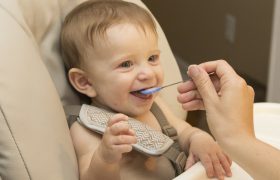The Effects of Caffeine in Kids and Teenegers

It’s no secret that energy drinks, various soda types and of course coffee all contain different amounts of caffeine, largely used to increase one’s energy levels when in need. As an adult, you may be used to having your cup (or cups, really) of coffee in the morning, either as soon as you wake up or all throughout the morning in order to start functioning properly. For you, the daily dose of caffeine could be something absolutely necessary in order to start the day right, which, believe it or not, makes it an addiction, despite it not appearing like one or not seeming like much of a big deal. If you are not dependant on drinking coffee in the morning, then it could be easier for you to watch your caffeine intake and keep it under control, only turning to drinking caffeine-based drinks when you need an extra push.
However, the same need for an extra push, be it a push towards being more alert or having more energy, is the same need that gets teenagers addicted to caffeine as well. Whenever school starts to become more stressful and suffocating with exams, homework, projects and the eternal dread that is peer pressure amongst children of all ages, the feeling of running out of time starts to settle in and it pushes teens to cut down on the hours they dedicate to the much-required sleep and rest in favor of studying or working. It’s not at all beneficial, and not only does it prevent them from getting the rest needed for their bodies and minds to recover and develop properly, but it makes their system beg for an alternative to the sleep they are missing out of, naturally.
And what is the most common alternative? Caffeine.
While it might provide a quick fix if they have to study for an urgent test, intake of caffeine turned into a routine won’t be quite as helpful. While it might make them feel as if they’re managing better with the extra energy, it can still very easily turn into an addiction they aren’t aware of, and they will experience withdrawal symptoms just like anyone else whenever they start neglecting the dose they had previously gotten used to.
What other effects are there?
Children and adults react differently to a whole lot of substances depending on what their body is already used to and depending on the kind of stress it is put under.
Caffeine offers convenient helping hands when it comes to boosting your energy levels, making you more alert and able to be present at the moment where you’re needed, and it might increase the drinker’s focus, but if a child who suffers from anxiety or high blood pressure picks up the habit, it might not be so healthy for them to keep it up. Caffeine increases the consumer’s blood pressure and heartbeat rate, causing feelings of restlessness, irritability, and nervousness, which worsen the child’s already present bad feelings.
The effects
When drank as a replacement for sleep, caffeine can lead to developing various degrees of insomnia as well. The child could drink coffee now to make sure they can stay up and focus on studying tonight, and as the caffeine does not kick in immediately, drinking it until its effects show will keep them up later even much longer after they’re all done with work. You as an adult drink it to be more energic throughout the day, so your child should also keep in mind that caffeine has lasting effects and it shouldn’t be consumed nearing their bedtime so they can still get the quality sleep they need while growing up.
Other side effects can be noticed and experienced when accidentally consuming anything caffeine-based while on other medication that might not mix well with it. It’s better to avoid consuming anything that could interfere with medicine or antibiotics of any kind while administrating them, since you can never know how they will manifest when mixed and what types of side effects could be experienced, and a child’s still-developing immune system is weaker than an adult’s. Whenever sick, it’s also indicated to stay hydrated by having a high intake of liquids and water predominantly, but caffeine acts as a diuretic, which means it makes the body get rid of the water. It can cause a heightened sense of anxiety and muscle tremor, as well as headaches that can worsen the child’s state.
 When it comes to spotting the caffeine withdrawal, the teen will struggle with various symptoms that can look a lot like flu symptoms, but it’s a clear sign that they should start cutting down on the caffeine intake and help get their body back on the right track of functioning. Symptoms include headaches, tiredness, difficulty in focusing on certain tasks or having trouble studying, even cold or hot spells might be experienced.
When it comes to spotting the caffeine withdrawal, the teen will struggle with various symptoms that can look a lot like flu symptoms, but it’s a clear sign that they should start cutting down on the caffeine intake and help get their body back on the right track of functioning. Symptoms include headaches, tiredness, difficulty in focusing on certain tasks or having trouble studying, even cold or hot spells might be experienced.
If it comes to spotting such symptoms and the teenager needs to start controlling the dose of caffeine they take as a routine, introducing alternatives for gaining energy can be a very good idea, as well as limiting the caffeine resources around the house. Lower the quantity of coffee they drink by limiting the number of cups a day they are allowed, and stock up on other liquids for them to consume when they feel like they need a little energy bonus. Natural juices and smoothies are a healthy alternative, so long as you watch the sugar dosage in them, as well as turning drinking water in a more appealing alternative by squeezing some lemon or other fruits in, or placing mint leaves in for aroma, with the reasonable amount of sweetener needed for it to be enjoyable and refreshing. That way, your teen will keep hydrated and refreshed throughout the day just the same. Tea is also a great alternative, although even some types of tea might include caffeine, so it’s just a matter of properly researching before buying.
Lastly, after learning about the effects caffeine has over your child, if you set on the journey to help them cut back on it, you have to keep in mind that you are their source of inspiration, and you should always pose as a role model for them. Discuss the ups and downs of drinking coffee with them and present them the health situation they could be heading towards and make sure you support their attempts at cutting down on caffeine by becoming aware of your consumption and whether you could also use a smaller intake of coffee rather than your usual dosage. Make sure that drinking coffee doesn’t seem like something to take for granted, or like it’s part of the normalcy of a routine and the child will start to become aware of whether they need to change their habits as well.






